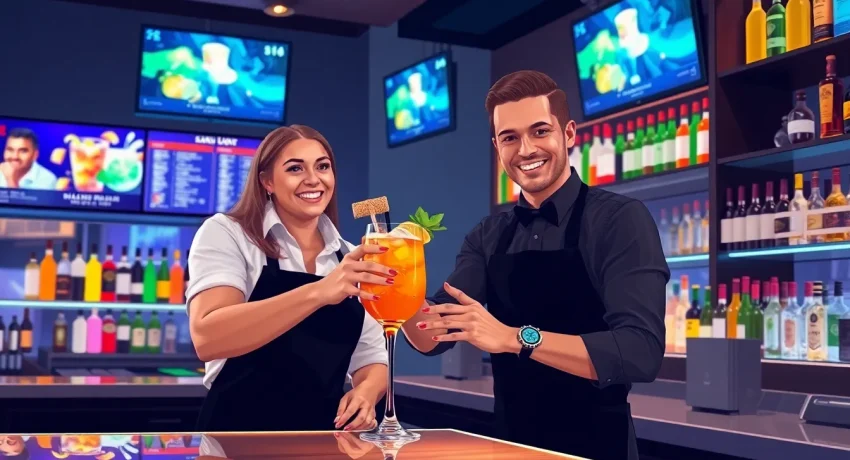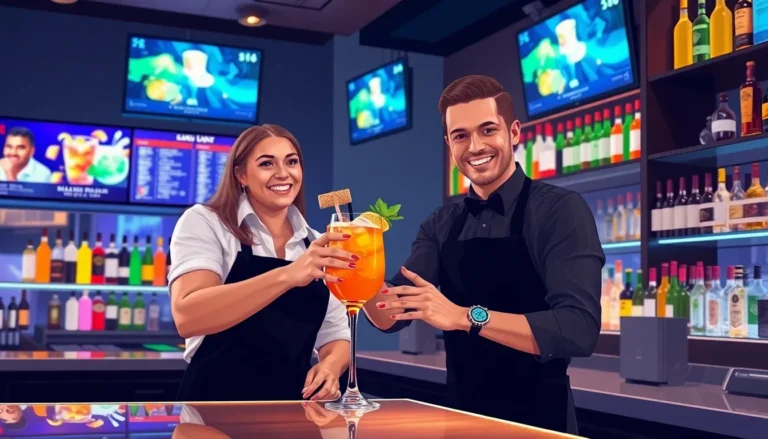Table of Contents
ToggleIn a world where technology meets tipples, “fintech alcohol” is shaking things up like a well-mixed cocktail. Imagine a bustling bar where your favorite drink is just a tap away, and your wallet’s as happy as a clam. This intriguing blend of finance and the spirited beverage industry is transforming how people buy, sell, and enjoy their drinks.
Understanding Fintech Alcohol
Fintech alcohol represents a fusion of financial technology with the beverage industry. This innovative concept enhances consumer experiences in purchasing and enjoying alcoholic beverages.
Definition of Fintech Alcohol
Fintech alcohol refers to technology-driven solutions that streamline interactions between consumers and the alcoholic beverage market. Mobile apps, contactless payment systems, and digital platforms exemplify this integration. Additional features like real-time inventory management enhance convenience, allowing customers to order drinks seamlessly. This concept aims to improve accessibility and personalization in the bar environment.
Evolution of the Fintech Alcohol Industry
The fintech alcohol industry has undergone significant transformation over the past decade. Initially, traditional retail methods dominated, focusing on in-person transactions. Digital payment solutions began emerging in the early 2010s, paving the way for a more interconnected market. With the rise of mobile apps, customers gained the ability to order drinks directly from their smartphones. Regulatory changes also played a key role in shaping the industry by enabling online sales and delivery services. As the market evolves, partnerships between beverage companies and fintech firms drive further innovation, enhancing consumer choices and experiences.
Key Players in Fintech Alcohol

Significant developments in fintech alcohol highlight key players shaping the industry landscape. These companies and their innovative approaches create new pathways for consumer engagement in the beverage sector.
Major Companies and Startups
Prominent companies like Alfred, a mobile app offering personalized beverage recommendations, leverage data to enhance user experiences. Companies such as Drizly streamline delivery services, allowing consumers to access alcoholic beverages conveniently. TapRm collaborates with various breweries and wineries, managing direct-to-consumer shipping. Startups like Minibar Delivery focus on seamless purchasing through user-friendly platforms. These entities drive competition and innovation in the fintech alcohol space, shaping trends for consumer convenience.
Innovative Platforms and Solutions
Technology solutions redefine how consumers interact with alcohol purchasing. Mobile payment systems facilitate quick checkouts, enhancing the buying experience. Real-time inventory management tools empower bars and retailers to maintain optimal stock levels. Digital platforms like Thirstie enable brands to create personalized shopping experiences tailored to consumer preferences. Blockchain technology offers transparency in sourcing and age verification, which ensures compliance with regulations. Each solution boosts efficiency and improves access to a diverse range of products in the market.
Benefits of Fintech Alcohol
Fintech alcohol offers significant advantages, transforming both consumer experiences and business operations.
Enhanced Consumer Experience
Enhanced customer engagement serves as a key benefit. Innovative mobile apps provide easy access to drink options, allowing users to browse selections from local bars and retailers. Real-time inventory tracking means customers know what’s available before visiting a bar. Personalized recommendations based on preferences simplify the decision-making process. Contactless payment solutions ensure quicker transactions, reducing wait times. Improved shopping experiences lead to greater satisfaction and loyalty among consumers.
Streamlined Operations for Businesses
Efficient inventory management significantly benefits bars and retailers. Automated systems reduce the risk of stockouts or overstock situations, optimizing supply levels. Mobile ordering capabilities enhance order accuracy, minimizing errors associated with in-person transactions. Digital payment solutions streamline financial processes, allowing for faster fund transfers. Data analytics provide insights into consumer trends, helping businesses tailor their offerings. Overall, increased operational efficiency leads to enhanced profitability in the fintech alcohol landscape.
Challenges and Regulatory Considerations
The intersection of fintech and the alcohol industry presents unique challenges and regulatory considerations. Compliance with legal frameworks remains critical as companies navigate varied state and federal laws.
Navigating Legal Frameworks
Understanding legal structures is essential for companies in the fintech alcohol space. Regulations can differ significantly from one region to another, impacting everything from sales to distribution. States impose specific age verification requirements, ensuring minors don’t access alcoholic beverages. Licensing requirements dictate how fintech solutions interact with traditional alcohol retailers. Adapting to these regulatory landscapes requires robust legal frameworks that ensure compliance while fostering innovation. Companies often engage legal experts to help interpret and navigate regulatory changes effectively.
Addressing Consumer Safety Concerns
Consumer safety concerns play a pivotal role in the fintech alcohol sector. Ensuring responsible purchasing is crucial for both companies and consumers. Verification processes should include features that confirm users are of legal drinking age, safeguarding against underage purchases. Technology also aids in monitoring consumption patterns and encouraging moderation. Implementing secure payment systems protects sensitive consumer data, fostering trust in digital transactions. Additionally, partnerships with established beverage brands enhance product quality and regulatory adherence. Each safety measure contributes to an overall positive consumer experience and bolsters brand reputation in a competitive market.
The rise of fintech alcohol is reshaping the beverage industry by integrating technology into every aspect of consumer interaction. This innovative approach not only enhances convenience but also fosters a more personalized experience for drinkers. As mobile apps and digital platforms continue to evolve, they’re setting new standards for how consumers engage with alcohol.
While the benefits are significant, challenges such as regulatory compliance and responsible consumption remain crucial. Companies must remain vigilant in navigating these complexities to build trust and ensure consumer safety. As the sector grows, the collaboration between fintech firms and beverage companies will likely drive further innovation, ultimately enriching the overall market landscape.




